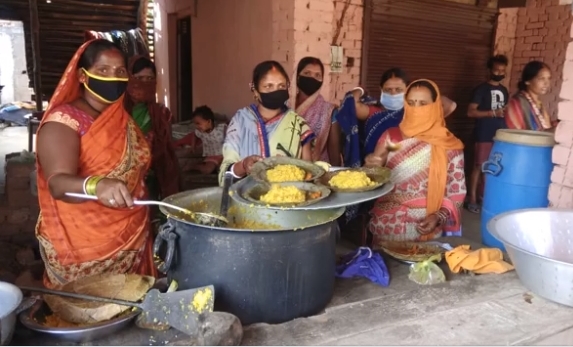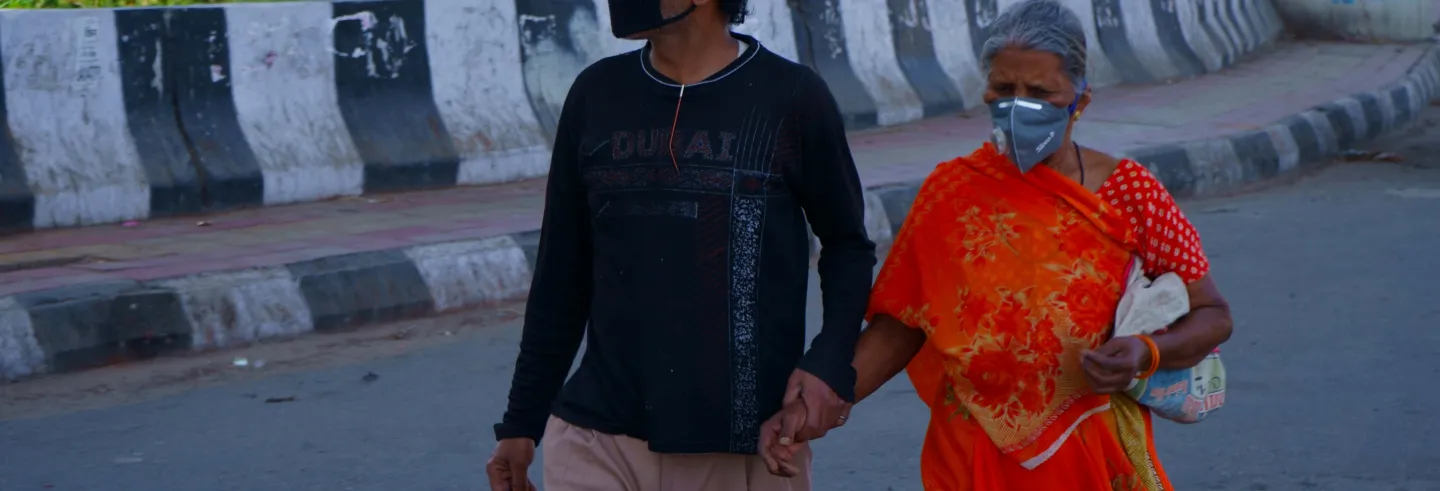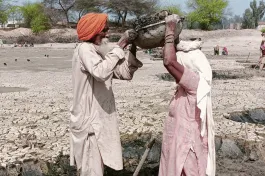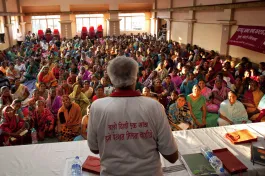What concerns related to Covid-19 have been on the top of the minds for those in India’s vast rural heartlands and in urban industrial worker colonies? How have these changed over the days since the nation-wide lockdown was imposed? We curate here some of the daily experiences of people engaging on Mobile Vaani, a network of voice-based community media platforms across Bihar, Jharkhand, Uttar Pradesh, Madhya Pradesh, Delhi NCR, and Tamil Nadu.
The voices here present the unfolding of the crisis: from people’s initial impressions during the early days of the virus in India, to how they became careful and changed their behaviours, and finally, how they are now coping with the ongoing lockdown.
Please click on the in-line links below to hear from the people themselves.
January-early March: A curiosity
The earliest conversations around the coronavirus were about a ‘Chinese’ virus that triggered the curiosity of our users in rural India, as a virus that only affected those who had travelled abroad and could be controlled by following simple steps. In late January, when infections were detected in India, the focus was still on the ways the virus spread, its symptoms, and ways to protect oneself. If anything, it was considered an opportunity for India to take advantage of, by usurping the position China has as the manufacturing hub of the world.
The coronavirus has proved to be economically virulent for China and the rest the world. India can raise its production and exports and give the world economic relief. This is a challenging moment, but it can be taken advantage of too. The government and industrialists should jointly decide how they can take over China’s foreign markets. This is also an opportunity to quicken Make in India and increase exports and services for other countries. —Bhim Raj, Jamui, Bihar
Mid-March: As Covid-19 spreads, rumours increase and incomes dwindle
Within a few days, though, as India’s wave of infections spread, the story changed. Rumours spread that eating chicken or any other meat could cause one to contract the infection. Poultry farmers and butchers told us that they saw a drastic loss in business due to falling prices. Some poultry farmers ended up spending more since they stopped getting orders but still had to keep their existing stock fresh—a double loss in income.
By mid-March, as several state governments announced that cinema halls, schools and colleges were to remain shut till 31 March, more stories of economic distress started surfacing. These were especially from people who earned their livelihood working at small businesses like shops and printing presses, or those selling food, or street vendors.
‘If not due to Coronavirus, daily wage workers will die of hunger,’ became a common refrain.
The biggest impact is on daily wage workers. The government closed down schools to prevent the spread of coronavirus and that’s good. But those who sell things on thelas, who work in malls or hotels, they eat only when they earn for the day. Their families will starve. Forget the coronavirus, they will die of hunger. That’s why the government must do something to protect daily wage workers. —Phool Chand Singh, social activist, Ghazipur, Uttar Pradesh
'Fighting an infection requires money, but we are losing income'
Messages advocating methods to reduce the spread of coronavirus increasingly began to surface on our platforms. Many of our users in rural areas began to talk about the importance of sanitisers, masks, maintaining a one-metre distance when speaking with people, and of avoiding stepping out of the house.
Factories began shutting down and managers told employees they might not be able to retain them for more than 2 or 3 months if conditions did not improve. These were the lucky employees. Many workers reported that they would not get paid at all for the days the factories remained closed. 'We’ll go back to our villages, what else,’ many migrant workers said.
I heard from another worker that their factory owner called for a meeting and said he does not know when the situation will improve. He does not have money to pay his employees for more than three months. If things do not improve after that, he said that the workers have to find other jobs or go back to their villages. Buyers have called and asked them to not produce pieces until they call again, so work has almost stopped. Business owners are quite worried about how to sustain their business. —Meena Kumari, Tirupur, Tamil Nadu
Even as governments encouraged shops selling essential items to stay open, shopkeepers reported steadily falling demand. The emerging theme was: 'fighting an infection requires money, but we are losing income.'
March 19: PM Modi addresses the nation—a reality check on what ‘no crowding’ means
All the same, there was generous support to the impending idea of a lockdown. Awareness about how Covid-19 spreads had reached most corners of the country. We heard from many users that the disease spreads in crowds, “so we must stay put.” A mela usually held during the Hindu Navratra festival in Madhya Pradesh was cancelled. Rail routes in Jamalpur, Bihar, were diverted, affecting vendors and tempo and truck drivers. There were also overwhelming calls for financial support, especially for daily wage workers.
I used to earn Rs 1,000 a day, but for the last 15 days, it has been difficult to earn even Rs 100, 50, or even 20. There are very few customers. The government should help daily wage workers and their families.[Otherwise] this lockdown is a very good step. The coronavirus likes crowds, so if there are no crowds, it won’t spread. It will also solve the problem of air pollution. —Nitesh Kumar Roy, runs a cyber centre in Jamui, Bihar
By the time Prime Minister Narendra Modi addressed the nation for the first time on the threat from the coronavirus, our users had told us that several factories had already shut down. “How will we sustain ourselves if we only stay at home?” asked a worker. Over 80 districts and several cities including Delhi, Mumbai, and Chennai announced lockdowns till 31 March. Worries began to spike, especially among migrant workers.
March 22-31: A lockdown only for the privileged—the city version
On March 22, even as millions across India united to show their support to health workers on the Janata Curfew announced by the prime minister, reports of workers stuck in Gujarat, Rajasthan, Tamil Nadu and Delhi/NCR started surfacing. These migrant workers, already living on meagre wages and with chronic job insecurity, suddenly found themselves unemployed, cashless, and in many cases, homeless as they were unable to afford rent. Most were starving as they did not have money to buy food. We heard stories about workers belonging to Bihar, Uttar Pradesh, and other states, now stuck in states like Kerala and Karnataka, or cities like Jalandhar, Mumbai, and Manesar.
We have no provisions. We get rice and dal from the ration shop, but we have nothing to use to cook. We used to buy [fuel] oil, but that requires a walk of 10 km, and we’re afraid to go out now for fear of policemen beating us up. We do get food from the government, but it’s only once a day and it’s provided at different times each day—sometimes 2 pm, sometimes 3. It’s mota chawal and kele ka sabzi; no dal. —Rakesh Kumar from Samastipur, Bihar, who is stuck in Kasargod district, Kerala
Going back home has been their only hope. ‘If we die, we want to at least die at home.'
A thread we heard continuously was the snatching of whatever dignity migrant workers held on to in places far away from home. Even if migrants are receiving help from governments, a situation of uncertainty and fear makes them feel even more distant from home, as in the case of Rakesh Kumar who struggles with unfamiliar food.
In this situation, going back home has been their only hope. ‘If we die, we want to at least die at home,’ was a thought many shared. By this time, some had already returned home, such as this security guard who worked in Delhi, or this young factory worker from Mumbai. On the other hand, there were reports of some workers being forced to work a night shift without any protective measures, in order to meet anticipated high demands in the coming days.
As the Janata Curfew gave way to a 21-day countrywide lockdown from 25 March onwards, thousands of migrants began to make their way back home. Many began walking hundreds of kilometres as they found that they could not take buses or trains to reach home. Some shared concerns about not being able to pay rent or feed their children. Others wondered what would be in store for the homeless who lived on pavements.
I work in Ahmedabad as a tailor. From March 22 to 31, tailoring and clothing factories have been shut down. Other small-scale employees have also been affected by this—the ones who sell tea or snacks. Workers have been told to stay at home. What will happen to daily wagers? Adults may bear hunger, but one- or two-year-old children, they will not be able to. Has anyone thought about this? This disease is killing people, but more than that, hunger will kill people including children... How will people live through these ten days? I hope the government takes these realities into account when deciding their next steps. —Ravinder Singh, a native of Jhansi district, Uttar Pradesh
Dignity compromised, the poor trudged on. Some died along the way, due to hunger, exhaustion, even accidents.
Over the next few days, stories of migrants making their way home by any means possible—on foot, by bikes, and in some cases even autos—filled our channels. People were starving. Some were lucky to find help from concerned villagers or civil society organisations along the way. Some were able to get assistance from local authorities too, but the needs were far higher than the supply. There also seemed to be a lack of coordination, which could have been resolved by directing people to the right places for help.
Bihari auto drivers in Delhi are taking their vehicles on to the highways to get home… and youth are making the long journey to Bihar on bikes. Auto drivers are driving on high speeds, their curtains down and with two and three passengers in the rear seat, resting for short periods at dhabas before continuing their journey. Since shops are shut during the lockdown, they aren’t getting any food or water on the way. —Ramesh Kumar, a Mobile Vaani reporter from Jamui, Bihar
Shortly thereafter, ‘social distancing’ and ‘lockdown’ became familiar phrases in the commentary we received. State borders were tightened and many migrants walking back home faced violence from the police for flouting the lockdown. Dignity compromised, the poor trudged on. Some died along the way, due to hunger, exhaustion, even accidents.
After the attempts of the Delhi and Uttar Pradesh governments to arrange for buses to ferry Delhi/NCR-based migrants back to their homes in Uttar Pradesh, the central government tightened state borders. It requested state governments to take all efforts to ensure migrants were treated well and fed. Even though state governments were putting in significant efforts, the demand far exceeded what they were able to arrange. We kept hearing stories of migrant workers running out of provisions. By initiating several helpline numbers for such workers, we were able to connect many of them with local administrations or NGOs for help. As late as 6 April, we continued to receive these grievances.
March 22-31: A lockdown only for the privileged—life in the heartland
Back in towns and villages, people faced the prospects of their income running out. Daily wage workers and the self-employed rued not being able to feed those at home, what with no income and soaring prices of vegetables and other essentials.
'I can only dream of eating vegetables. I don’t know what the future holds for us.'
"We can’t afford vegetables at the prices they’re being sold," said one woman in Dindigul, Tamil Nadu. Local administration attempted to control shopkeepers trying to exploit the situation to sell products at inflated prices, but hoarding continued and kept pushing prices high.
We aren’t able to get out of our homes, especially with little children who can’t be contained in a small house with one or two rooms. We didn’t get anything from ration shops. We got 18 kg of rice last month, and I can’t run my family with that quantity or quality of food. Onions and tomatoes are selling at Rs 100 a kg. I can only dream of eating vegetables. It looks like we can only survive on porridge. I don’t know what the future holds for us. —Mailathaal, a member of a construction workers’ union from Dindigul
Governments started rolling out relief measures such as an increased ration allowance and cash assistance for women, people with disabilities, and those with Below Poverty Line ration cards. But these amounts were not enough. Many intended beneficiaries were not even making enough money to afford subsidised provisions. These are families that do not earn enough to save.

Since the lockdown was announced, we have been receiving stories of hundreds of villagers, including a temple priest, who were stuck without provisions. We have been trying to connect them to the local administration for help. People have also been sharing stories about not getting the benefits the government has announced, be it for provisions or for gas cylinders. A few women said they do not know when or how the government-announced relief measures will reach them.
A woman from Madhubani, Bihar, who had taken her daughter to Delhi for treatment, remains stuck there. A man struggled for days to immerse his mother’s ashes in a river.
The lockdown exposed other fault lines in the society, especially on gender lines. A female construction worker in Dindigul, Tamil Nadu, for example, highlighted how she already gets paid less per day compared with men. This crisis, announced with little warning or time to prepare, only worsened the situation. Another daily wage labourer from Kodaikanal, Tamil Nadu, the sole earner in her household, described how she has been taking loans to manage her expenses.
I used to earn Rs 160 a day, and would struggle to pay off an existing loan with that money. My husband does not work—he is at home all day—so with what I earn, I have to pay off loans and make sure we all get food to eat. Today, onions sell at Rs. 130 [ a kg] and a quarter kg of lady finger sells at Rs 40… tomatoes at Rs 60 [a kg]. How can I manage all this [if I don’t work]? I’m running my householding by borrowing small sums of money from people I know…I can only repay this if I start working again. I’m sharing my struggles with you in the hope that the government does something for us. —Easwari, Kodaikanal, Tamil Nadu
We heard unexpected stories too, which highlight different facets of Indian life in the heartlands. A woman from Madhubani, Bihar, who had taken her daughter to Delhi for treatment, remains stuck there and is unable to return, despite pleas to officials. A man struggled for days to immerse his mother’s ashes in a river, until he got permission to do so in the Ganga ghat in Dhanbad.
I came on 16 March to Delhi for the treatment of my daughter who has a blood infection, and got stuck in the lockdown. I have heard that [Delhi chief minister] Arvind Kejriwal has made provisions for food, but they can’t be seen on the ground. I even called our MP for help to get back home, but he too said that there won’t be a problem about food, and now he is not answering my calls… I am here alone with my 15-year-old daughter. —Gunjan Singh, a native of Madhubani, Bihar
March 22 till date: Farmers’ struggles come to the fore
At the turn of the month, we began to hear stories of farmers suffering. The lockdown has made life harder. In Jharkhand, for instance, farmers were already suffering from an unexpected hailstorm that affected their harvesting timelines.
Farmers are unable to harvest their crops due to a lack of labour, being unable to access harvesting machines, or simply because the police is not allowing them to walk to their fields to work. If they had managed to harvest their crop before the lockdown, they are not able to take it to the market because the mandis are shut or transport is not available, such as this case of a ferry service being suspended. Even as governments are attempting to help farmers sell produce themselves by having them apply to be ‘vendors' (who can then sell directly), confusion remains over whether they can take vehicles out or not.
This is sowing season, but farmers are not able to access seeds and fertilisers. [Farmers are deeply concerned] how their family will survive in the coming months, but also how the country will manage to meet its food needs.
Our farms are north of the Ganga and to reach them we have to cross the river on ferries, which have been suspended. Because of this, we aren’t able to fetch diesel to run our tractors or take our workers to help with farm work; this means we aren’t able to reap the benefits of the hard work that we have put in. —Sanjay Yadav, a farmer from Munger, Bihar
This is sowing season, but farmers are not able to access seeds and fertilisers. Some are not even able to feed their animals. We hear sorrow over the losses, mingled with deep concern of how their family will survive in the coming months, but also of how the country will manage to meet its food needs.
End-March: The focus on health and other community reactions
In a strange twist, it is only over the turn of the month that people’s focus has actually turned to what the coronavirus means to their health.
We have heard reports of Primary Health Centres (PHCs) in villages not being sufficiently stocked. Health staff have only basic or sometimes no Personal Protection Equipment. Some PHCs have a poor quality of sanitation and lack soap and running water. Private clinics are closed. One instance reported was about people crowding around a hospital without social distancing.
With Covid-19 overwhelming the healthcare system, other issues also came to the fore. People do not know where to go for other ailments, injuries, and illnesses. We heard a chilling story of a man in Nalanda district, Bihar, going from one health facility to another with his pregnant wife who was bleeding.
The doctor at the Bihar Sharif Sadar Hospital [in Nalanda, Bihar] said she could not be treated as her bleeding was considerable and she was critical... The woman had to be ferried around the district on a bike, a saline drip in her, in search of a private clinic, but they were all shut due to the lockdown... Finally, with the help of the media, she was treated at the Sadar Hospital. —Mahtab, Mobile Vaani reporter from Nalanda, Bihar
People do not know where to go for help for ‘regular’ diseases, since outpatient departments in Public Health Centres are closed.
People do not know where to go for help for ‘regular’ diseases like malaria, since outpatient departments in PHCs are closed. The demands on public health facilities are unprecedented, but people, understandably, feel anxious in these situations.
Villagers are also stigmatising their neighbours, especially migrant workers who have returned from the cities. Following recent government orders, they have been put in isolation centres, but the hygiene and preparedness of these is frustrating the people who will be stuck there for two weeks. The centres do not even have mosquito nets. Unsurprisingly, we have heard that a few returning migrants, who were taken to the hospital for isolation, absconded. Health workers are not being spared either. Working with poor PPE kits and protective measures, they are viewed with suspicion as sources of infection.
April: Growing awareness gives hope
However, we see that people’s awareness about Covid-19 is growing. There are various awareness campaigns happening, both from the administration and at a personal level, such as a painter who has painted six walls with information on staying safe from infection. Masks are being distributed, facilities are being sanitised. Sometimes, due to people’s reports on Mobile Vaani, local officials spur into action. People also recognise the importance of mental health. One user shared why constantly focusing on Covid-19 is not going to help and people should find means for recreation and learning to keep themselves occupied.
Talking and thinking about coronavirus all the time could make us fall ill. Let’s remember to spend time with our families, enjoy entertainment on TV or read books. It is important to balance our fast-paced lives with some rest, and this lockdown seems like an opportunity to do that. Even as governments are taking efforts to stop the spread of coronavirus, it is our responsibility to support them by exercising restraint and being brave. —A user from Ghazipur, Uttar Pradesh
About Mobile Vaani: A communication and civil society infrastructure
Mobile Vaani reaches over 1 million people across India and is supported by a large network of community volunteers who come from among our users. It is operated by the social enterprise Gram Vaani
Gram Vaani’s primary mode of operation lies in connecting people in need of help with organisations and authorities who can be of assistance to them. Highlighting issues and problems on this public platform plays an important role of demanding social accountability to ensure quick action. We advocate that technology alone cannot lead to development. It is people who use the technology who actually bring about the impact. The Covid-19 pandemic has reinforced this belief.
Gram Vaani's COVID partner response team comprises public health researchers, development communications specialists, community mobilisation trainers, software development and technology operations engineers, and impact programme managers and researchers. Between March 24 and April 7 alone, over 70 reported issues have been solved from across Mobile Vaani’s areas of operation. This impact would not have happened had our networks not been in place in districts across several states. In a world dominated by quick-and-easy news, our community-led media platform offers a window into how a crisis pans out among the less privileged and the marginalised, and what it takes to solve their issues.
This has made us realise the importance of nurturing and sustaining a communications and people infrastructure that can not only support communities during regular periods, but becomes of crucial importance during times of emergency such as now. We leave it as an open challenge for donors, investors, and governments to discover means for the financial sustainability of such an infrastructure.










